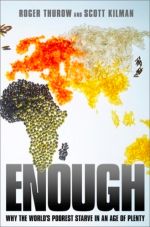As I write this review, I’m sitting on my deck looking out at dozens of acres of avocado, orange and lemon trees. Yesterday, I helped to plant a vegetable garden – the produce being grown for a local restaurant. The irony is that as I am surrounded by abundance here in America, I’m reading about those in other countries who have less than nothing. “Enough Why the World’s Poorest Starve in an Age of Plenty,” written by journalists Roger Thurow and Scott Kilman, details the struggle of countries, especially Africa, to feed their people.
 Agriculture is the lifeblood of the world. As a matter of fact, is it the largest industry in the world. Yet many countries cannot compete with world prices in part due to subsidies in other countries such as America and the European Union as explained by the authors. These subsidies keep commodity prices artificially low, so low that most subsistence farmers in third world countries can’t compete. Traditionally, the answer to this problem has been food aid. Give the enormous surplus grown in places like America, to third world countries.
Agriculture is the lifeblood of the world. As a matter of fact, is it the largest industry in the world. Yet many countries cannot compete with world prices in part due to subsidies in other countries such as America and the European Union as explained by the authors. These subsidies keep commodity prices artificially low, so low that most subsistence farmers in third world countries can’t compete. Traditionally, the answer to this problem has been food aid. Give the enormous surplus grown in places like America, to third world countries.
While food aid is a matter of life or death for millions of people each year, it does not lift the people out of poverty. It does not solve the problem of widespread starvation. The farmers of Africa must have a way to make a living – one that allows them to buy food. According to the authors, more “food” aid needs to be given in the form educating farmers on how to grow more crops with less. Helping them to build irrigation systems, giving them access to affordable hybrid seeds and fertilizers and allowing the commodity markets to work in a way that farmers from around the world can sell competitively sell their food.
The reason that more educational aid is not given, say the authors, is that food aid is a way for American or European farmers to sell their surplus crops. If other countries have enough food, and begin to compete in world markets, then farmers from first world countries will lose money.
One interesting example of aid was in the telling of a story about a couple from Ohio, the Rufenachts, who are raising cattle for a village in Africa. The proceeds from the sale are sent over the people who have used the money to improve their agriculture through building irrigation systems, dams, and more. When their town found out about what they were doing, they joined in to raise even more money. In one year the Ohio town raised more than $30,000 for agriculture projects in the village. It was a moving story about how farmers in America are helping farmers in Africa.
In the book, the authors list out several ways to conquer hunger including, keep promises to expand development aid, create a global fund to aid small farmers in Africa and to invest in infrastructure. This is a moving book about the plight of the hungry and what not only governments but individual people can do to help eliminate hunger.

